Swing music is a style of jazz that developed in the United States during the late 1920s and early 1930s. It became nationally popular from the mid-1930s. The name derived from its emphasis on the off-beat, or nominally weaker beat. Swing bands usually featured soloists who would improvise on the melody over the arrangement. The danceable swing style of big bands and bandleaders such as Benny Goodman was the dominant form of American popular music from 1935 to 1946, known as the swing era, when people were dancing the Lindy Hop. The verb "to swing" is also used as a term of praise for playing that has a strong groove or drive. Musicians of the swing era include Duke Ellington, Benny Goodman, Count Basie, Cab Calloway, Benny Carter, Jimmy Dorsey, Tommy Dorsey, Woody Herman, Earl Hines, Harry James, Lionel Hampton, Glenn Miller, Artie Shaw, Jimmie Lunceford, and Django Reinhardt.
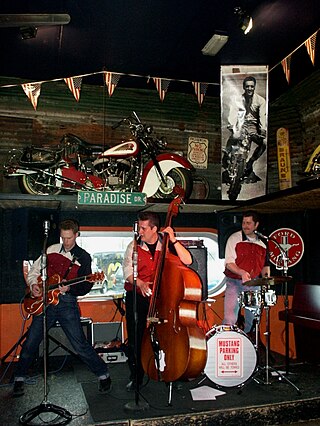
Rockabilly is one of the earliest styles of rock and roll music. It dates back to the early 1950s in the United States, especially the South. As a genre it blends the sound of Western musical styles such as country with that of rhythm and blues, leading to what is considered "classic" rock and roll. Some have also described it as a blend of bluegrass with rock and roll. The term "rockabilly" itself is a portmanteau of "rock" and "hillbilly", the latter a reference to the country music that contributed strongly to the style. Other important influences on rockabilly include western swing, boogie-woogie, jump blues, and electric blues.

The Reverend Horton Heat is the stage name of American musician James C. Heath as well as the name of his Dallas, Texas-based psychobilly trio. Heath is a singer, songwriter and guitarist. A Prick magazine reviewer called Heath the "godfather of modern rockabilly and psychobilly".
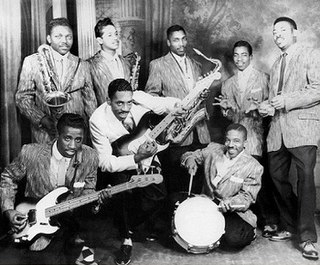
Kings of Rhythm are an American music group formed in the late 1940s in Clarksdale, Mississippi and led by Ike Turner through to his death in 2007. Turner would retain the name of the band throughout his career, although the group has undergone considerable line-up changes over time.
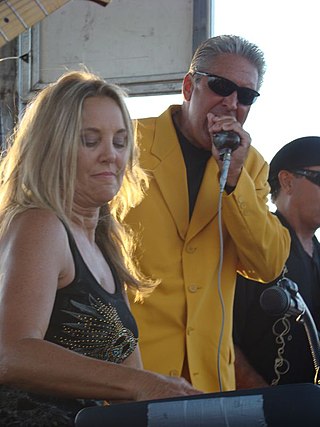
Rod Piazza is an American blues harmonica player and singer. He has been playing with his band The Mighty Flyers, which he formed with his pianist wife Honey Piazza, since 1980. Their boogie sound combines the styles of jump blues, West Coast blues and Chicago blues.

Earl Zebedee Hooker was a Chicago blues guitarist known for his slide guitar playing. Considered a "musician's musician", he performed with blues artists such as Sonny Boy Williamson II, Junior Wells, and John Lee Hooker and fronted his own bands. An early player of the electric guitar, Hooker was influenced by the modern urban styles of T-Bone Walker and Robert Nighthawk. He recorded several singles and albums as a bandleader and with other well-known artists. His "Blue Guitar", a slide guitar instrumental single, was popular in the Chicago area and was later overdubbed with vocals by Muddy Waters as "You Shook Me".
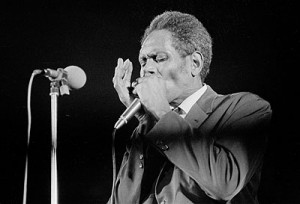
Walter Horton (April 6, 1921 – December 8, 1981), known as Big Walter (Horton) or Walter "Shakey" Horton, was an American blues harmonica player. A quiet, unassuming, shy man, he is remembered as one of the premier harmonica players in the history of blues. Willie Dixon once called Horton 'the best harmonica player I ever heard'.

James Henry Cotton was an American blues harmonica player, singer and songwriter, who performed and recorded with many fellow blues artists and with his own band. He also played drums early in his career.

Charles Douglas Musselwhite is an American blues harmonica player and bandleader, one who came to prominence, along with Mike Bloomfield, Paul Butterfield, and Elvin Bishop, as a pivotal figure in helping to revive the Chicago Blues movement of the 1960s. He has often been identified as a "white bluesman".
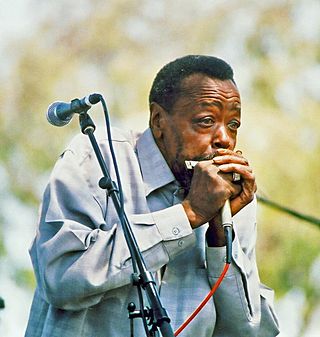
Carey Bell Harrington was an American blues musician who played harmonica in the Chicago blues style. Bell played harmonica and bass guitar for other blues musicians from the late 1950s to the early 1970s before embarking on a solo career. Besides his own albums, he recorded as an accompanist or duo artist with Earl Hooker, Robert Nighthawk, Lowell Fulson, Eddie Taylor, Louisiana Red and Jimmy Dawkins and was a frequent partner with his son, the guitarist Lurrie Bell. Blues Revue called Bell "one of Chicago's finest harpists." The Chicago Tribune said Bell was "a terrific talent in the tradition of Sonny Boy Williamson and Little Walter." In 2023, he was inducted in the Blues Hall of Fame.
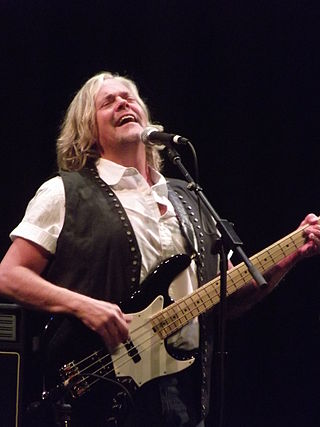
John Cowan is an American soul music and progressive bluegrass vocalist and bass guitar player. He was the lead vocalist and bass player for the New Grass Revival. Cowan became the band's bassist in 1972 after the departure of original bassist Ebo Walker and was noted as being the only member of New Grass Revival not to come from a bluegrass background.

Bernard John Marsden was an English rock and blues guitarist. He is primarily known for his work with Whitesnake, having written or co-written with David Coverdale many of the group's hit songs, such as "Fool for Your Loving", "Walking in the Shadow of the Blues", "Ready an' Willing", "Lovehunter", "Trouble", and "Here I Go Again".

The Amazing Crowns was a rock band that began in Providence, Rhode Island in 1993. The lineup of the Crowns consisted of vocalist Jason "King" Kendall, bassist Jack "the Swinger" Hanlon, guitarist J.D. Burgess, and drummer Judd Williams. The band's music has been described as "a hot & fast concotion of punked-up rockabilly".
"Rock Island Line" is an American folk song. Ostensibly about the Chicago, Rock Island and Pacific Railroad, it appeared as a folk song as early as 1929. The first recorded performance of "Rock Island Line" was by inmates of the Arkansas Cummins State Farm prison in 1934.
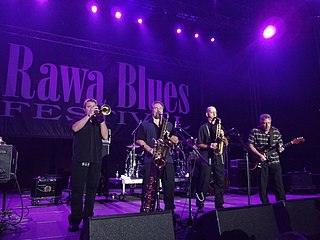
Roomful of Blues is an American jump blues and swing revival big band based in Rhode Island. With a recording career that spans over 50 years, they have toured worldwide and recorded many albums. Roomful of Blues, according to the Chicago Sun-Times, "Swagger, sway and swing with energy and precision". Since 1967, the group’s blend of swing, rock and roll, jump blues, boogie-woogie and soul has earned it five Grammy Award nominations and many other accolades, including seven Blues Music Awards. Billboard called the band "a tour de force of horn-fried blues…Roomful is so tight and so right." The Down Beat International Critics Poll has twice selected Roomful of Blues as Best Blues Band.
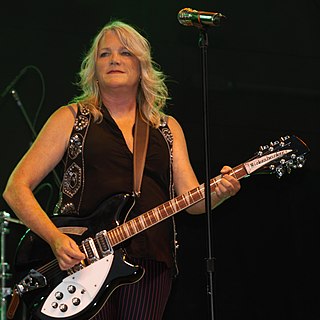
Catherine E. Richardson is an American singer, songwriter, actress, and narrator from the Chicago suburbs in Illinois. She is the lead singer for the band Jefferson Starship and her own Cathy Richardson Band, and has performed the Janis Joplin parts for Joplin's former band Big Brother and the Holding Company.
Mississippi Heat is an American blues band based in Chicago, led by harmonica player Pierre Lacocque. Formed in 1991, the band has toured in the United States, Canada, and Europe, with occasional performances in South America and North Africa.
The Mighty Blue Kings is a Chicago jump blues band, formed in 1995.
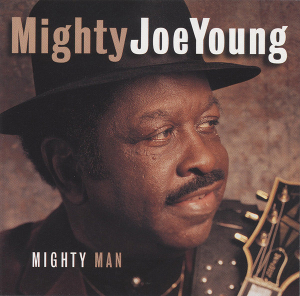
Mighty Man is an album by the American musician Mighty Joe Young, released in 1997. It was his first album for Blind Pig Records, although the label would reissue some of Young's earlier work. Young supported the album with a North American tour.















